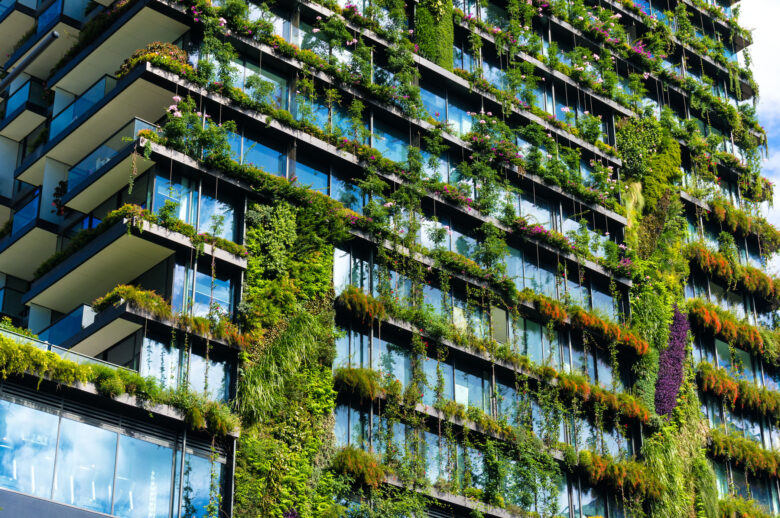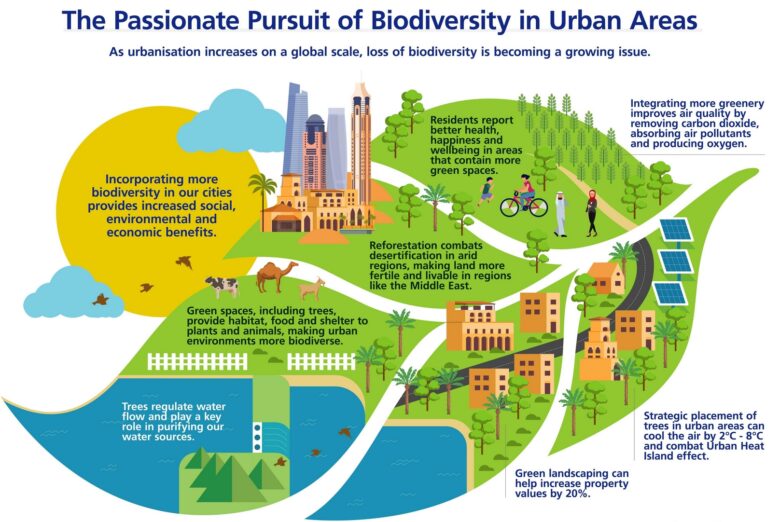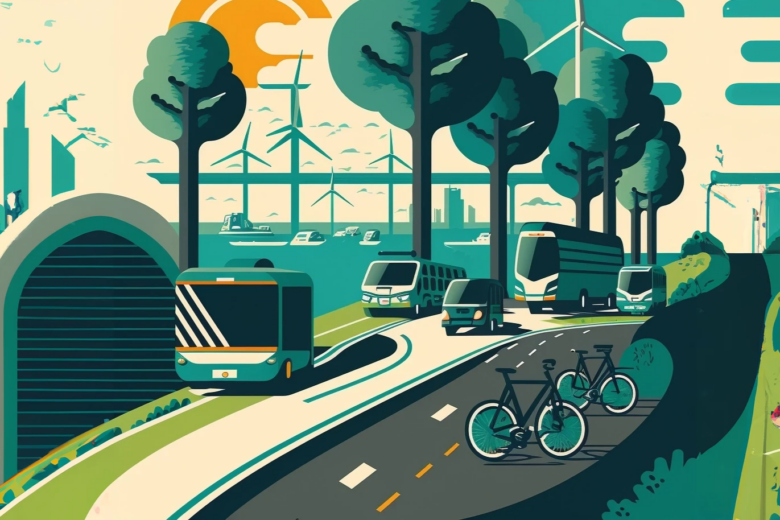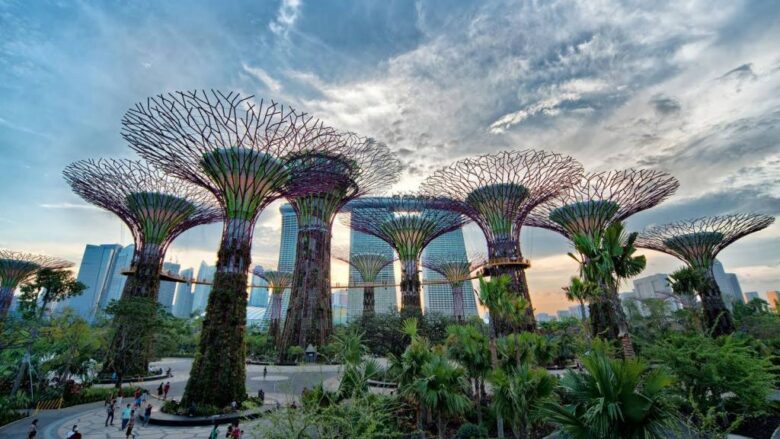In an era when the world is grappling with climate change, sustainability is no longer a choice but a necessity. This global requirement for sustainable practices is reshaping numerous industries, and real estate is no exception. In Singapore, the ‘Garden City’ of the world, suburban real estate has evolved significantly in the past few years, embracing sustainable designs and eco-friendly practices. This article delves into the specifics of how Singapore is leading the way in creating sustainable, eco-friendly suburban habitats.
Contents
Embracing Green Building Practices
The first pillar of Singapore’s eco-friendly real estate scene is the robust adoption of green building practices. This approach to design and construction reduces the negative impact on the environment while enhancing the quality of life for the occupants. These practices have rapidly become the norm rather than the exception in Singapore’s suburban real estate scene.

Source: youmatter.world
Energy Efficiency
In a typical home, appliances, heating, and cooling systems are major contributors to the energy bill and carbon footprint. To tackle this, Singaporean real estate developers employ energy-efficient appliances and HVAC systems in their buildings. Additionally, the buildings are architecturally designed to make optimal use of natural light and ventilation, significantly reducing dependence on electricity.
Use of Sustainable Materials
The choice of construction material plays a pivotal role in making a building green. The developers are consciously moving away from conventional materials towards more sustainable options. These include reclaimed or recycled materials, locally sourced supplies to reduce transportation emissions, and materials with low embodied energy.
Water Management
Water management is another key focus area in Singapore’s green building practices. Developers incorporate rainwater harvesting systems, greywater recycling systems, and water-efficient appliances to reduce water consumption. These practices ensure a reduction in the strain on the city-state’s water supply.
Green Spaces and Biodiversity
Another defining feature of Singapore’s green suburban real estate developments is the emphasis on green spaces and biodiversity. Singapore’s reputation as the ‘Garden City’ is not unfounded. The city-state has made conscious efforts to create and maintain an ecological balance within its urban locales.

Source: middleeast.polypipe.com
Incorporating Nature into Design
Singapore’s real estate developments give significant importance to natural green spaces within their premises. These spaces are carefully designed and planted with a variety of native plant species, which attract local wildlife and promote biodiversity.
The Health and Wellbeing Angle
These green spaces are not just for the environment; they also play a crucial role in enhancing residents’ wellbeing. Research has shown that living close to nature improves mental health, reduces stress, and encourages physical activity.
Sustainable Transport and Connectivity
Singapore’s suburban real estate sector also places a strong focus on sustainable transport and connectivity. By reducing reliance on personal vehicles and promoting public transport, Singapore reduces carbon emissions and fosters healthier lifestyles.

Source: ippi.org.il
Public Transport and Connectivity
Suburban developments are often strategically located near public transportation hubs, making commuting convenient for residents. This feature encourages residents to use public transport, reducing carbon emissions in the process.
Pedestrian and Bicycle Friendly
In addition to public transport, these suburban real estate developments also prioritize pedestrian and bicycle-friendly infrastructure. By including features like bicycle storage facilities and well-connected pedestrian paths, these suburbs encourage residents to adopt healthier and more sustainable modes of transport.
Waste Management and Recycling
In line with Singapore’s commitment to sustainability, suburban real estate developments are also incorporating efficient waste management and recycling strategies.

Source: woodly.com
Waste Segregation and Recycling
Every suburban development is equipped with innovative waste management systems, including designated areas for waste segregation and recycling. These systems enable and encourage residents to dispose of their waste in a more eco-friendly way.
Composting
Composting is another area where Singapore’s suburban real estate shines. Some developments have dedicated composting areas where organic waste is turned intonutrient-rich compost, which can be used to enrich the green spaces within the premises. This not only reduces the amount of waste going to landfills but also creates a useful resource in the process.
Community Involvement and Education
Perhaps one of the most important aspects of the sustainability push in Singapore’s suburban real estate is the active involvement and education of the community. Developers and property managers organize workshops, seminars, and other programs to educate residents about the importance of sustainable practices.

Source: spark.school
Community Gardening
In many suburban developments, residents come together to participate in community gardening initiatives. These initiatives serve multiple purposes – they promote green living, provide an opportunity for residents to grow their food, and help build a sense of community.
Educational Programs
A significant part of this strategy is the organization of comprehensive educational programs by real estate developers. The objective of these programs is not only to inform but to bring about a transformative change in the attitudes and practices of residents.
Workshops on Energy Conservation
Workshops on energy conservation are frequently organized as part of these educational initiatives. These sessions provide residents with valuable knowledge about energy use and waste, and practical tips on how to reduce their energy consumption. For example, residents learn about the benefits of using energy-efficient appliances, the importance of switching off appliances when not in use, and how to use natural light and ventilation to reduce dependence on artificial lighting and cooling.
Waste Management Seminars
Another crucial area of focus in these educational programs is waste management. Seminars are conducted to educate residents about the importance of waste segregation and the correct ways to recycle. These sessions often include information on what can and cannot be recycled, the environmental impact of incorrect waste disposal, and practical tips for reducing waste generation. The inclusion of composting workshops introduces residents to the process of converting organic waste into nutrient-rich compost, further reducing the waste sent to landfills.
Environmental Awareness Initiatives
In addition to specific topics like energy conservation and waste management, these educational programs also include broader initiatives to raise environmental awareness. These may include screenings of environmental documentaries, talks by environmental experts, and interactive sessions where residents can discuss their ideas and concerns about sustainability. The goal is to create a community of informed and responsible residents who are actively involved in maintaining and improving their sustainable living spaces.
Looking Ahead: Singapore’s Sustainable Future

Source: journeys.dartmouth.edu
Singapore’s holistic approach to eco-friendly suburban real estate is a testament to the city-state’s commitment to creating a sustainable future. By focusing on various aspects – from green building practices and biodiversity preservation to sustainable transport and community involvement – Singapore is ensuring that its suburbs are not just places to live but sustainable havens that contribute positively to the planet.
The success of this approach is visible in developments such as the Pinetree Hill Condo. This suburban development successfully integrates many of the sustainable features discussed in this article, showcasing the potential for suburban real estate to be both luxurious and environmentally friendly.
The city-state’s sustained commitment to green living serves as an inspiration and a benchmark for other countries around the world. As we face the threat of climate change, it is evident that the path to the future is through sustainability. And in this regard, Singapore’s suburban real estate industry is leading the way.
